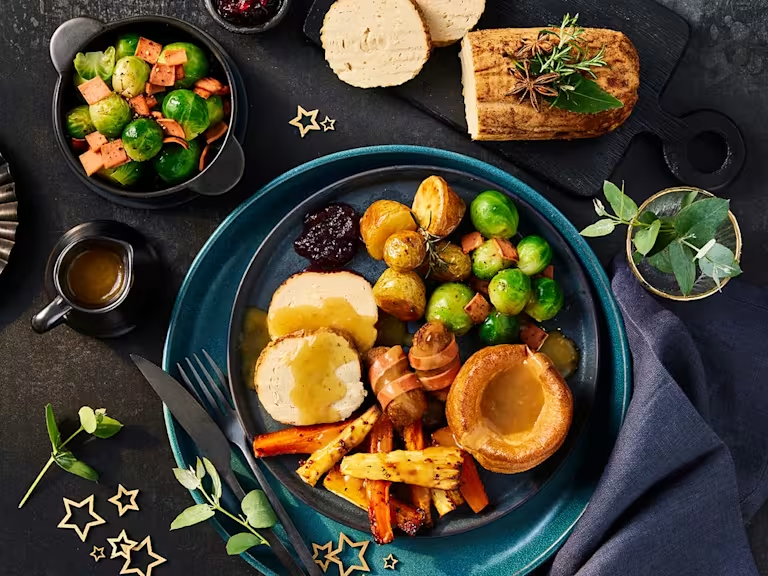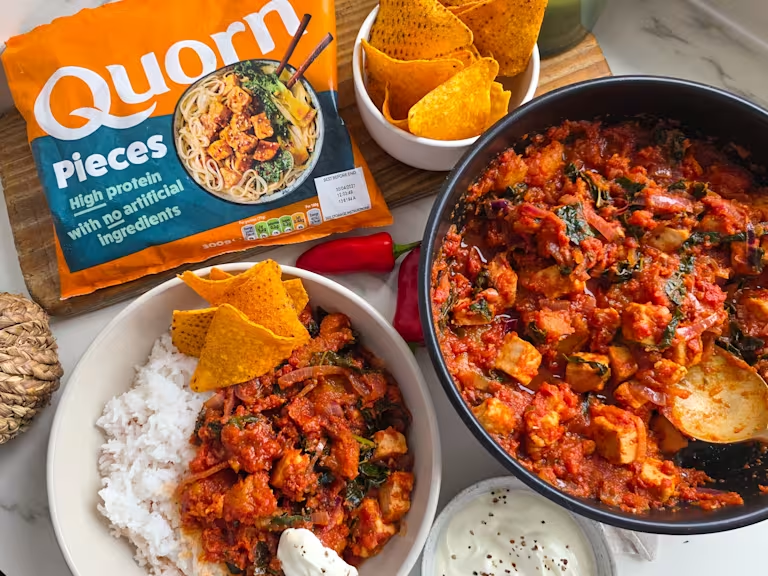
What is the difference between vegan and vegetarian diets?
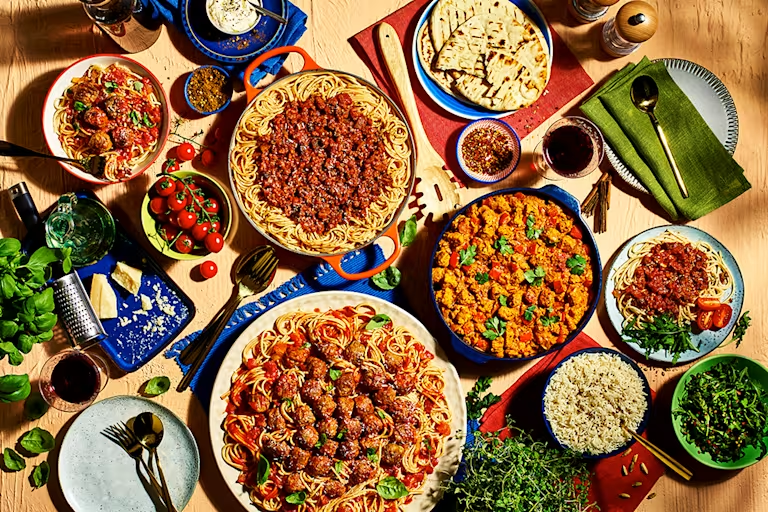
Going meat-free can mean choosing from a range of different dietary options. Both vegans and vegetarians have made the decision to give up eating meat, but there are still some key differences between the two.
In this blog, we’ll dive into the differences between these diets.
Plant based eating falls on a spectrum and there are several diets that people can choose to follow. When we say ‘diets’ we don’t mean the typical cutting calories or removing carbohydrates, we’re talking about lifestyle food choices: vegetarianism, veganism, pescatarianism, and flexitarianism.
Difference between vegan and vegetarian diets
Neither vegans nor vegetarians eat meat from any animal. The main difference between vegan and vegetarian is that vegans also don’t eat animal products like dairy and eggs. Someone who’s chosen to be vegan may extend their lifestyle choice beyond the dinner table to choices around clothing, cosmetics, and other products made from or tested on animals.
What is a vegan diet?
Following a vegan diet means choosing to no longer eat meat or other foods produced from animals. A typical vegan diet is based around grains, nuts, fruits and vegetables alongside alternatives to meat, eggs and dairy.
There may be restrictions on the ingredients you can use, but there’s no limit to the delicious dishes you can rustle up in the kitchen. Quorn’s range of vegan food products, which contain mycoprotein can be another delicious addition to your mealtimes, and it’s nutritious too – a great source of the protein and fibre our bodies need.
Benefits of a vegan diet
Eating a vegan diet can have lots of benefits which contribute to individual health and the health of the planet.
Nutrition
Even without meat, fish or dairy, a balanced vegan diet still provides most of the nutrients your body needs to stay healthy. However, there are still a couple of watchouts, for example the NHS recommends eating fortified foods or taking supplements containing micronutrients like vitamin B12, calcium and iron – which aren’t easy to get enough of following a vegan diet.1
Protein is an essential part of our diet – we need it to grow, develop and maintain bone and muscle. Even without meat, fish, and dairy there are still lots of protein-rich foods like nuts, seeds, beans, and meat alternatives like Quorn that don’t come from animals.
Quorn mycoprotein which is in all Quorn products is a rich and complete source of protein – and it contains 6g fibre per 100g.2 Most vegan food also contains a lot less saturated fat than is found in animal-based food. Reducing consumption of saturated fat helps to maintain normal blood cholesterol which supports heart health.3
Health
The British Nutrition Foundation (BNF) describes a healthy diet as being balanced and diverse to get all the important nutrients we need.4 Following the UK Eatwell Guide, starchy carbohydrates, fruit and vegetables are the mainstay of a healthy diet as they contain a range of important vitamins and antioxidants for optimal health. The BNF recommends opting for wholegrain carbohydrates, beans, and legumes (e.g., lentils and chickpeas) for a higher fibre intake, which helps digestion and staying full for longer. The Eatwell Guide recommendations are to avoid red, processed meat and to have two portions of fish a week and for dairy foods it recommends choosing lower sugar and fat options.5
There are also vegan and vegetarian versions of Eatwell Guide for those following a plant-based diet.6
Eating healthily can help reduce the risk of diseases such as coronary heart disease, obesity, and type 2 diabetes. Vegans (and vegetarians) may find themselves at a reduced risk of health conditions including hypertension and heart disease as a result of including more fibre rich foods and less saturated fat in the diet.7 Research also shows that vegans may have consistently lower blood sugar levels than non-vegans, which may reduce the chances of developing type 2 diabetes.7
Sustainability
As a global population, the way we are currently consuming and producing food isn’t sustainable for the future. Animal agriculture comes with huge consequences – it has a higher carbon footprint and uses more water to produce meat than wheat. Producing a single portion of beef for example requires 1,640 litres of water, which is enough to fill up 20 bathtubs.8
An article published on Nature journal this year stated that replacing 20% of global beef consumption with microbial protein, such as Quorn mycoprotein within the next 30 years could halve deforestation and the carbon emissions associated with it.9
Quorn mycoprotein has a carbon, land and water footprint of at least 70% lower than chicken.10 So if you are considering moving to a vegan (or vegetarian) diet for environmental reasons, there are vegan food alternatives available to help you transition to a more sustainable diet.
What is a vegetarian diet?
Unlike vegans, vegetarians tend to eat animal products like eggs and dairy – though there are three different categories that all come under the vegetarian umbrella:
Lacto Vegetarian:
Eating dairy products like cheese and milk, but not meat, seafood or eggs.
Ovo Vegetarian:
Eating eggs but cutting out meat, seafood and dairy.
Lacto-Ovo Vegetarian:
Choosing not to eat meat or seafood but still consuming eggs and dairy.
Benefits of a vegetarian diet
Like a vegan diet, avoiding meat has been shown to benefit our health and the environment. Vegetarian and vegan diets have similar benefits, nutrition, and environmental impact.
Nutrition
Because some vegetarians may continue to eat dairy or eggs, it may be easier for them to get more of the micronutrients they need, but they still need to supplement their intake. A study found that B12 deficiency in vegans was over 60% and over 40% in vegetarians.14 Vitamin B12 is needed daily and is important for skin, eye and nervous system health as well as enabling the body to release energy from the food we eat.11 Significant sources of B12 are animal products so it is important for vegans and vegetarians to supplement this. Iron is another nutrient commonly consumed from meat; however, it is found in beans, nuts, and dried fruit. Lack of iron can lead to fatigue, breathlessness, and heart palpitations.12
For vegetarians, it is easy to find effective and healthy substitutes for the nutrients that eating meat would have provided – such as the range of Quorn vegetarian food products, which can be used as a substitute for meat in a variety of delicious veggie dishes.
A balanced vegetarian diet is likely to contain more fibre than you would find on a meat-eater’s plate. As well as helping with digestion and keeping us regular, fibre keeps us feeling fuller for longer.13 Check out our selection of high-fibre vegetarian meals made using a variety of Quorn products.
Health
Like the vegan diet, vegetarians who carefully balance their diet can benefit from a lower risk of heart disease and hypertension. It may also reduce the risk of developing type 2 diabetes because of the lower blood sugar levels associated with cutting out meat.14 Should you choose to supplement your diet with meat alternatives, look for one that has a high nutritional protein quality. Quorn mycoprotein that’s used to make our products contains all nine of the essential amino acids that our body needs but can’t make itself.
Sustainability
Following a vegetarian diet can impact on carbon emissions. The livestock sector generates around 16.5% of global greenhouse gas emissions15 with an omnivorous diet requiring over 1.25x higher land use compared to a vegetarian-based diet.16
Meat alternatives which are produced with sustainability in mind, such as Quorn Mince for example has a land footprint 16 times lower than that of beef mince.17 Following a vegetarian diet has a positive environmental impact, however even just eating less meat or cutting out beef can have an impact on carbon emissions.
Pescatarian diet
Pescatarians eat seafood, dairy and eggs but no other types of meat. This can be for a range of reasons, including wanting to improve personal environmental impact or a preference to simply reduce the amount of red meat consumed as examples.
Flexitarian diet
Flexitarians are meat eaters that actively reduce their meat consumption by opting for vegetarian meals often. Those consuming a flexitarian diet may choose the occasional meat or fish-based dish but mostly focus on a plant-based diet. For some it’s more about health and environmental benefits of adding new sources of nutrients to a regular meal plan, rather than cutting anything out.
For example, this can mean having vegetarian lunches and breakfasts everyday but eating some meat with dinner or the choice to have 4 vegetarian days a week. As the name says it is flexible and just means doing your personal best to eat vegetarian based meals as much as possible or to meet your lifestyle goals.
Vegan vs Vegetarian – which one’s better?
Ultimately, the amount of animal products in a diet will depend on personal preference. It can feel difficult to transition towards eating fully vegetarian or vegan so if you are interested in reducing animal products in your diet, why not start with a few meals a week. Even small changes can impact overall health and the health of the planet. But if you feel confident going vegetarian or vegan that’s great too! Ultimately, it’s up to you which one you choose. If you’re looking at wider issues such as animal welfare and environmental impact, then that could also play a part in your decision.
So whether you’re skipping more than meat or just looking to mix up mealtimes with vegetarian dishes, most meat-free diets have potential benefits. The key is ensuring you’re getting enough of what your body needs through alternatives to meat, as well as eating a balanced diet.
Looking for some inspiration, check out our vegetarian and vegan recipes for some inspiration!
1 https://www.nhs.uk/live-well/eat-well/how-to-eat-a-balanced-diet/the-vegan-diet/ 2 Mycoprotein__Nutritional_and_Health_Properties 3 https://www.nhs.uk/live-well/eat-well/how-to-eat-a-balanced-diet/eat-less-saturated-fat/ 4 https://www.nutrition.org.uk/healthy-sustainable-diets/healthy-and-sustainable-diets/a-healthy-balanced-diet/ 5 Eatwell_guide_colour.pdf 6 https://images.vegsoc.org/uploads/2023/12/Vegetarian_Society_Eatwell_guide_veggie_MAR2018.pdf 7 https://www.ncbi.nlm.nih.gov/pmc/articles/PMC7613518/ 8 Quorn Footprint Comparison Report (the Carbon Trust, 2022) 9 https://www.nature.com/articles/d41586-022-01238-5 10 Quorn Footprint Comparison Report (the Carbon Trust, 2022) 11 https://www.nhs.uk/conditions/vitamins-and-minerals/vitamin-b/ 12 https://www.nhs.uk/conditions/iron-deficiency-anaemia/ 13 https://www.nhs.uk/live-well/eat-well/digestive-health/how-to-get-more-fibre-into-your-diet/ 14 Herrmann, W. (2017). Vitamin B 12 Deficiency in Vegetarians. Vegetarian and Plant-Based Diets in Health and Disease Prevention, [online] pp.791–808. doi:10.1016/b978-0-12-803968-7.00043-5. 15 Twine, 2021. https://www.mdpi.com/2071-1050/13/11/6276/htm 16 Chai et al., 2019. https://www.mdpi.com/2071-1050/11/15/4110/htm 17 Quorn Footprint Comparison Report (the Carbon Trust, 2022)
Recent news
All news
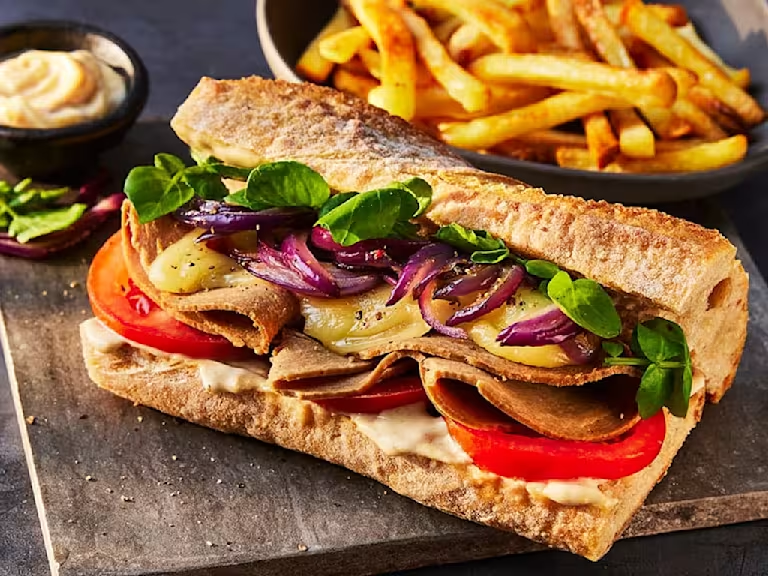
The Ultimate Sandwich Guide
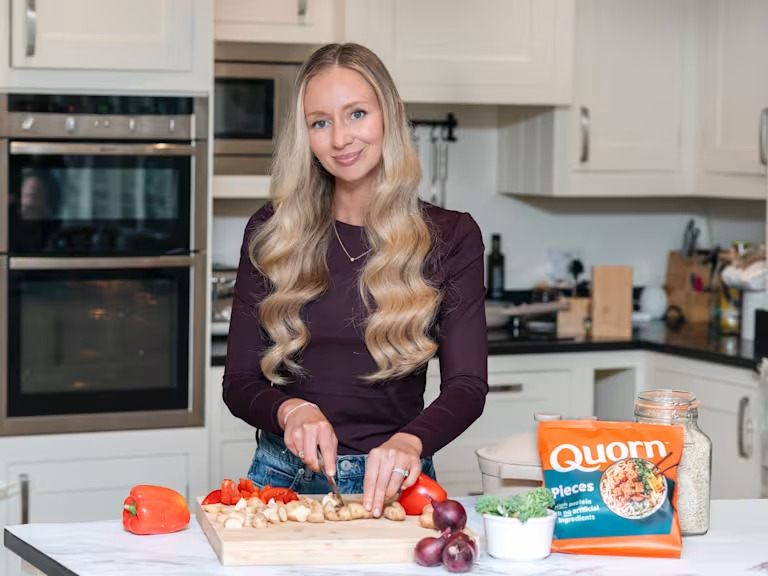

Sustainability WINNERS – FDF Awards 2025
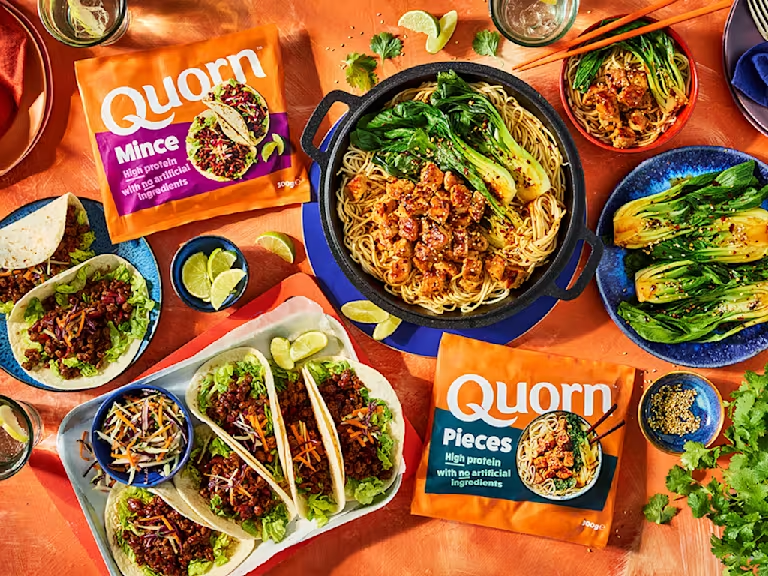
No Artificial Ingredients
